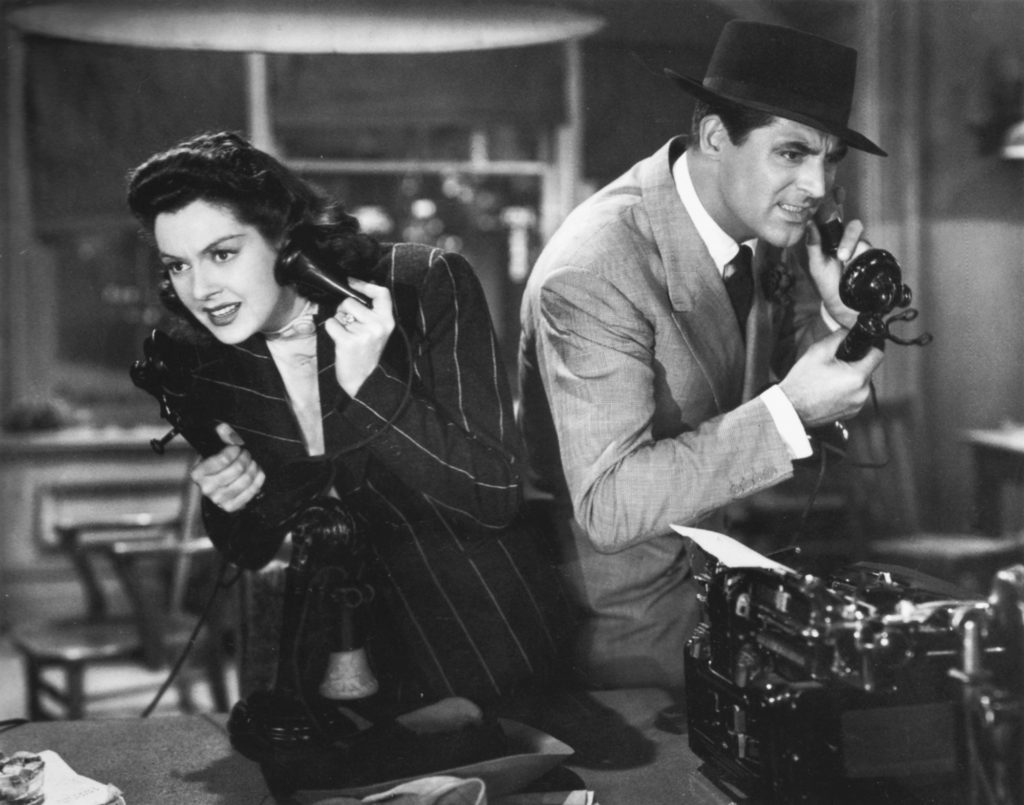
Tuesday
I read plays all day yesterday with an eye toward an upcoming class on “Battling Couples in Theatre and Film (the Comic Version).” The September course is part of Sewanee’s “Lifelong Learning” series.
As the course runs for four weeks, I will teach four plays and four movies, pairing a play with a film for each session.
“Romantic comedy” is an oxymoronic mixture of sentiment (heart) and wit (head). It has been cinema’s most popular genre at least since Clara Bowe played the “IT girl” in 1926, perhaps because joking about relationships protects a vulnerable heart. In rom-coms we get both love and laughter.
Battling Couples Comedy pushes the tension to a higher level. The fear of emotional vulnerability turns into hostility, often expressed through verbal barbs. Shakespeare all but invented the genre with Much Ado about Nothing (1598), where Beatrice and Benedick duke it out with spirited interchanges like the following:
Beatrice: I wonder that you will still be talking, Signior
Benedick: nobody marks you.
Benedick: What, my dear Lady Disdain! are you yet living?
Beatrice: Is it possible disdain should die while she hath
such meet food to feed it as Signior Benedick?
Courtesy itself must convert to disdain, if you come
in her presence.
Benedick: Then is courtesy a turncoat. But it is certain I
am loved of all ladies, only you excepted: and I
would I could find in my heart that I had not a hard
heart; for, truly, I love none.
Beatrice: A dear happiness to women: they would else have
been troubled with a pernicious suitor. I thank God
and my cold blood, I am of your humour for that: I
had rather hear my dog bark at a crow than a man
swear he loves me.
Benedick: God keep your ladyship still in that mind! so some
gentleman or other shall ‘scape a predestinate
scratched face.
Beatrice: Scratching could not make it worse, an ’twere such
a face as yours were.
Benedick: Well, you are a rare parrot-teacher.
Beatrice: A bird of my tongue is better than a beast of yours.
Benedick: I would my horse had the speed of your tongue, and
so good a continuer. But keep your way, i’ God’s
name; I have done.
Beatrice: You always end with a jade’s trick: I know you of old.
Taming of the Shrew also features such a battle although Kate’s total capitulation at the end (if that’s what she does) leaves a sour taste in the minds of many modern viewers. Better to have a cease-fire which leaves both parties standing tall.
Aphra Behn took a page from Much Ado when Helena sets her eyes on the libertine Wilmore in The Rover. Far ahead of her time in 1677, Behn validated women’s sexual desire when her heroine refuses life in a convent and settles for marriage only because it’s better than “a cradle full of noise and mischief, with a pack of repentance at my back.” If she could have anything she wanted, she would, like Wilmore, choose “all the honey of matrimony, but none of the sting.”
Head and heart grapple for ascendency in the other two plays I’ve chosen, George Bernard Shaw’s Pygmalion (which points towards a Higgins-Eliza marriage, despite what the author wrote in his afterword) and Edward Albee’s Who’s Afraid of Virginia Woolf (1962), which is so dark that not everyone sees it as a comedy. Having never taught either work, I look forward to new discoveries.
Regarding films, I’m in love with 1930’s and 1940’s screwball comedies but unfortunately can only pick two. I’m leaning towards Frank Capra’s It Happened One Night (1934), which established the conventions of the genre, and Howard Hawks’s His Girl Friday (1940), which barely allows any room for sentiment in its fast-paced dialogue between Rosalind Russell and Cary Grant. But choosing them would meaning leaving out Awful Truth, Bringing Up Baby, Philadelphia Story, Lady Eve, and Adam’s Rib. If you enjoy all these films as much as I do, you see my problem.
For the third film, I haven’t yet made up my mind between Pillow Talk (Doris Day and Rock Hudson, 1959) and Moonstruck (Cher and Nicholas Cage, 1987). The first continues the screwball tradition, the second walks a fine line between comedy and melodrama.
For the last film, I’ve settled on Mr. and Mrs. Smith, in which Brad Pitt’s and Angelina Jolie’s marriage is a life and death affair. Their battles will pair up nicely with George and Martha’s in Who’s Afraid of Virginia Woolf.
“Words of love so soft and tender won’t win a girl’s heart anymore,” Big Mama Cass sang in 1970. But playwrights have been showing this to be the case for centuries.